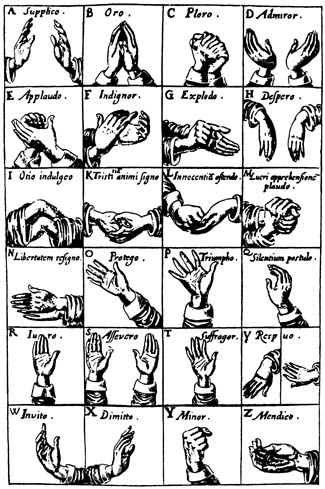Gesture Lab
How does gesture create meaning on the Renaissance stage, and how do we understand that meaning today?
Gesture Lab looked at the performance of shaming gestures on the Renaissance stage. These gestures, designed to humiliate, range from spitting to biting the thumb, and while they may speak to us in modern performance, they also have a rich contextual history. By looking at the taboos of Renaissance England, and the gestures which were used to shame people, we can better understand the social tensions of the period itself; and by looking at how these gestures were staged in plays, we can better understand the performative nature of daily life at this time.

Image: John Bulwer manuscript
On 12 August 2015, the Gesture Lab workshop was presented at the Sam Wanamaker Playhouse. Professional actors staged scenes from Romeo and Juliet (to see thumb biting), Henry V (to see the ‘Spanish fig’), and Richard III (to see spitting). After each scene, the audience were invited to give feedback. Over 100 people attended the event, and their thoughts were hugely enlightening. This project was vital to the research work being carried out by Miranda Fay Thomas for her PhD.
Project Team
Miranda Fay Thomas
Miranda graduated with first-class honours in English Literature at the University of York. She subsequently completed an MA in Renaissance Literature there, winning the Postgraduate English Department Prize. She is currently a PhD student in the English Language Centre at King’s College London. Her PhD is co-supervised by King’s and Shakespeare’s Globe. The topic of her thesis, titled Shakespeare's Body Language: Gesture, Shame, and Gender Politics on the Elizabethan and Jacobean Stages, is the first study of shaming gestures in Renaissance drama and how they are gendered.
Shakespeare’s Globe
Shakespeare's Globe was founded by the actor and director Sam Wanamaker, and is dedicated to staging the plays of Shakespeare’s age in a replica of the theatre he is most associated with, and is built just over 200 metres away from the original Globe. It is a unique resource, combining research, experimentation, education, and entertainment.
Shakespeare’s Globe comprises the main outdoor stage which hosts plays from April to October and opened in 1997; and the newly built Sam Wanamaker Playhouse, an indoor Jacobean theatre lit by candlelit and opened in 2014. There is also an exhibition centre under the outdoor stage, where visitors can learn more about the life and times of William Shakespeare, and daily tours of the Globe theatre. Ongoing research is a major part of Shakespeare’s Globe, and there are regular public events experimenting with theatre practices.
Gesture Lab is supported by the university's Culture team in collaboration with the Department of English and Shakespeare’s Globe.
This project is part of the Early Career Researchers scheme. Miranda Fay Thomas has been mentored by Dr Charlotte Fereday, previously the Knowledge Exchange Associate for the Faculty of Arts & Humanities and the Dickson Poon School of Law.